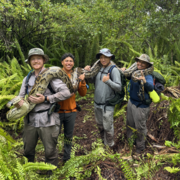Invasive Species
An invasive species is an introduced species that has established itself and causes negative impacts to the native environment, the economy, and even human health. WARC science is used by resource managers to help mitigate and control these problematic species, including the Burmese python, the Cuban treefrog, and invasive carp.













